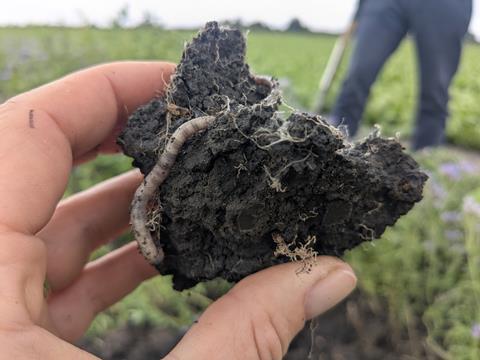Salad supplier has seen groundbreaking results from its trials of regenerative farming and Johnson-Su composting technique

Leading salad supplier G’s has increased head weight and reduced fertiliser use on its salad crops under a major trial of regenerative farming and a biological soil inoculation.
The company, which has been running trials across 4,500 hectares of its land in Cambridgeshire, has been making and using its own composting solution using the Johnson-Su technique, with groundbreaking results on crops including Iceberg and Red Gem.
Average head weights of Iceberg on plot trials are up by 13.5 per cent, with increased uniformity, while Red Gem lettuces have expressed visibly increased immunity through increased red colouring.
Fertiliser use on Iceberg was reduced by 40 per cent between 2018 and 2024, with reductions also successful on celery and potato crops.
The Johnson-Su solution is made using green and brown crop waste materials, which is then put through a 10-day thermal cycle and left to mature for a year. Earthworms are the only external input, with the resulting solution leading to higher fungal and bacterial activity in the soil.
“We started regen here because the land was deteriorating to the point where yields and quality were becoming compromised,” explains Julius Joel, G’s celery product director and part of the future farming team, based at Cambs Farms.
“We’ve got a pretty good handle on the levers that allow us to operate regeneratively with the same yields as farming commercially,” he said.
As part of a wider shift towards regenerative practices across the group, G’s has introduced cover cropping and reduced cultivations, as a base for the Johnson-Su trials, to gradually reduce fertiliser applications.
“The three pillars of the sustainability agenda are reducing greenhouse gases, restoring soil health and increasing biodiversity,” said Lucy Harler, manager of the future farms programme. “Historically we have seen them as separate but we now see how they are completely and utterly dependent on each other,” she said.
Fertiliser from agriculture makes up the majority of the UK’s nitrous oxide emissions, a powerful greenhouse gas emitter, and it is one of the highest emission hotspot for farming businesses looking at their own net zero objectives.
“We are part of domestic agriculture so we need to change our emissions,” added Joel.
Find the full story in FPJ’s upcoming Sustainability Special, out at the end of August. Contact subscriptions@fpj.co.uk to subscribe, or read via the app for existing subscribers.



